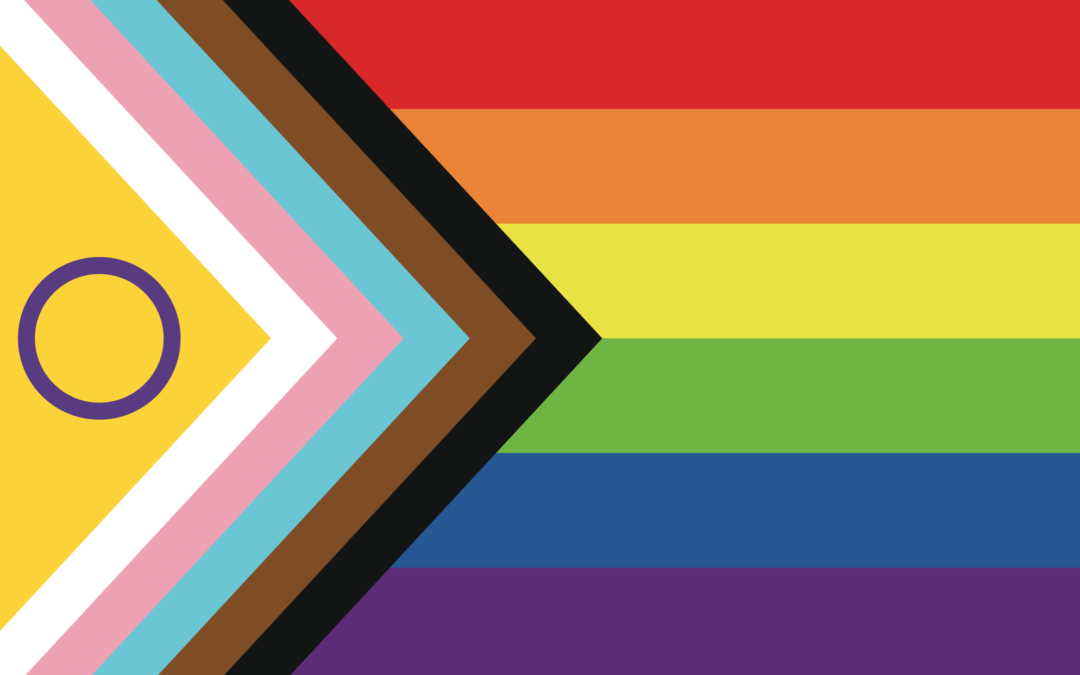Trigger warning: some discussion of gender-based violence in this newsletter.
Hello everyone!
Here we are at the end of a (mostly) sunny Pride month.
Pride is always full of joyful celebrations and is a time to celebrate on how far we've come as a society when it comes to LGBTQIA+ rights.
Take the Pride flag (pictured above) for example. You might have noticed in recent years that it has changed. We thought you might enjoy discovering how it evolved and exactly what all those new colours stand for…
The new flag is reworking of the Progress Pride flag, which was developed in 2018 by non-binary American artist and designer Daniel Quasar (who uses xe/xyr pronouns). Using the iconic rainbow flag designed in 1978, the redesigned flag celebrates the diversity of the LGBTQIA+ community and calls for a more inclusive society. This flag was again updated in 2021 by Valentino Vecchietti to incorporate the intersex flag.
Download our guide of what each colour represents here.
However, alongside this celebration of progress, Pride is also a chance to reflect on how far we still have to go.
In our latest podcast, Rox spoke to Sophie Cook (THC’s transgender consultant) and Aby Hawker (the founder of Transmission PR, a communications consultancy which specialises in transgender awareness and inclusion) about trans inclusion at work.
You can listen to this episode here.
Following the recording of the podcast, Rox felt compelled to call Sophie back in the spirit of courageous conversation to further explore an issue Sophie brought up at the end of the discussion. Sophie had concluded the podcast by saying, “the rights of one group do not come at the cost of the rights of another group.” Some feminists do believe this is what is happening and Rox wanted to continue the conversation.
We know that courageous conversations can be difficult. We decided that we wouldn't record this part of the discussion because of how triggering this public debate can be for trans people, and instead thought about our learnings.
From Rox…
- “What became clear to me was that Sophie was not the person to be having that conversation with. Why should she have to make the case for her right to exist? It’s cis-female women who can most help the trans community here.
- The recent explosion in conversation about female-only spaces is doing little to make cis-women feel safe, and is doing a lot to make trans women feel unsafe.
- Finally, I began to wonder if we are having the wrong conversation. Instead should we be focusing on why men are committing violence against women? It is easy to find numbers on the proportion of women that have been sexually assaulted. It is not easy to find numbers on how many male perpetrators there are. Equally, it is easy to find dialogue about keeping women safe, but not easy to find dialogue about preventing men from assaulting people. Why do men commit violence against women?”
Only a couple of weeks later, Sophie announced her exciting new appointment as “Speak Out Champion” for the Crown Prosecution Service. As we congratulated her, she shared that she’d been targeted with so much abuse on social media, as well as the wider press, that she didn’t feel safe in her own home.
While society continues to take cues from the media, who will hold the media accountable for inciting this hateful behaviour? Why are Sophie and so many others on the receiving end of such abuse and finding themselves defending their right to exist in the world?
This display of hate only days into Pride month was a shocking example of how the current environment is failing to contribute to everyone’s basic human right to safety. An inclusive world is one in which everyone can show up as the most authentic version of themselves and where everyone is equal. We just aren’t there yet. We need to take responsibility for this work, and not leave it for oppressed people to fight without support.
What can we do as individuals and allies to help contribute to a more inclusive world for everyone? We can educate ourselves better on the issues that minority groups are experiencing. And we can support, stand with and speak up for all those who need our voices in their fight for equality.
To up your knowledge base when it comes to some of these issues, check out our elearning modules covering LGBTQIA+ Inclusion and Gender Identity and Expression in the workplace.
Take care,
Team THC xx
